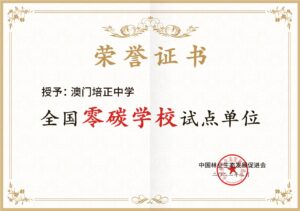
Residents are operating smart recycling machines for waste sorting (Source: https://kknews.cc)
In discussing the carbon neutrality measures in the Greater Bay Area, an important aspect we cannot overlook is how to innovate ways to combine environmental actions with economic benefits. Recent actions taken by Futian District in Shenzhen and Pui Ching Middle School in Macao provide good examples.
Futian District in Shenzhen recently introduced a platform called “Love Recycling · Love Sorting”. The platform uses an “Internet + Intelligent Recycling” model, and by setting up smart waste sorting and recycling stations in streets and communities, residents can exchange the waste they recycle for economic benefits. This new “waste recycling station” has been well received and highly praised by residents since its introduction.

Macau Pui Ching Middle School has been actively promoting environmental education. (Source: https://www.facebook.com/pcmsmo/)
On the other hand, Principal Gao Jinhui of Pui Ching Middle School in Macao is calling on teachers and students to actively participate in carbon reduction actions. They have chosen various methods, such as reducing the use of plastic, conserving energy, choosing green travel, and even purchasing certified voluntary emission reductions to offset their own carbon emissions, becoming “zero carbon citizens”. Such actions are not only a start to practicing a low-carbon life, but also aim to sow the seeds of ecological civilization in students’ hearts, cultivate green and low-carbon concepts, and become active builders of a beautiful human homeland.

Macau Pui Ching Middle School has received an honorary certificate. (Source: https://www.facebook.com/pcmsmo/)
These two examples clearly demonstrate that carbon neutrality is not just an environmental action, but also a practice of economics. Through innovative ways, carbon neutrality has become a product that can create economic value, further driving public participation and promoting the process of carbon neutrality.
Joaquim Leong







